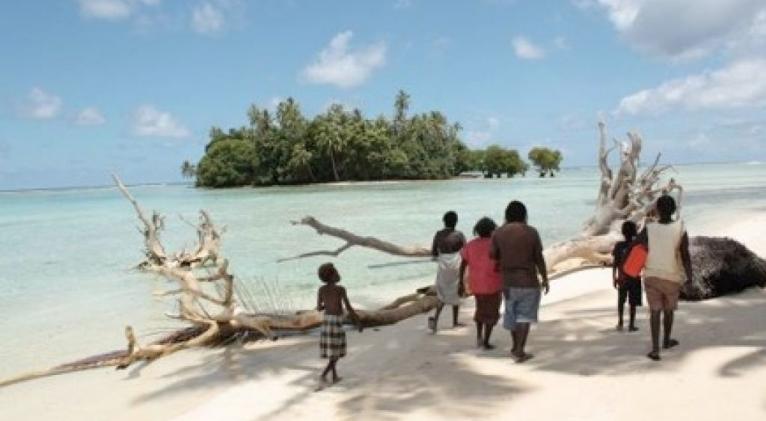Island nations shouldn't be left to drown from climate change

Tulun Atoll is not alone. Across the Pacific islanders are reporting similar changes as the sea is creeping up. Given that sea level rise is not uniform across the world (forget the bathtub that fills evenly!) it’s not surprising that in some island communities the impacts are becoming more quickly apparent.
And it won’t get better anytime soon. Previous sea level rise projections of around 1m by the end of the 21st century have recently been revised upward as new scientific studies published earlier this year found a doubling of Antarctic ice loss, and satellite based data revealed that the collapse of a large part of Antarctica is now considered unstoppable. The studies suggest that, over time, ice losses in East and West Antarctica “will change the coastline of the world” and may even amount to “global coastal destruction”.
It’s hardly surprising that leaders of some of the most low-lying island nations in the world, including Kiribati, Tuvalu and the Marshall Islands, are more and more desperate to raise the plight of their islands. Tuvalu prime minister Enele Sopoaga even likened climate change to “a weapon of mass destruction”.
The desperation of islanders is understandable. Countless low-lying islands around the world protrude only a metre or two above sea level and are acutely vulnerable to even very small rises in sea level. Their very existence is threatened by human-induced sea level rises and other climate change impacts such as coral bleaching, ocean acidification, storm surges, coastal erosion, saltwater intrusion and freshwater contamination. And yet small island developing states have contributed less than 1% to the global stock of greenhouse gasses now in the atmosphere.
What this means is that island communities are overwhelmingly not responsible for the rises in temperatures and sea levels which are increasingly threatening their survival. Some Pacific atolls are already relocating their island communities, and Kiribati has reportedly already bought tracts of land in Fiji to prepare for such a future relocation scenario. The Maldives - where none of the coral islands protrude over 1.8m above seal level - has also talked about doing this.
It’s heartening that New Zealand has recently granted residency to a family from Tuvalu, accepting their landmark claim that climate change effectively thwarted their return home. While it’s the first successful application of this type, it certainly won’t be the last time that climate change will force islanders to seek safer shores elsewhere.
New Zealand’s decision is commendable for a number of reasons, including recognition by the immigration and protection tribunal of climate change as an important causal factor in long-term displacement and human wellbeing. It’s also a tacit acceptance that the international refugee convention is not the appropriate or only instrument for offering protection, justice and a lifeline of hope to Pacific climate change refugees. Indeed, the refugee convention has already been determined to be irrelevant for climate change refugee situations by New Zealand’s court of appeal which earlier this year refused to recognise climate change refugee status to a family from Kiribati, arguing that in the absence of persecution Ioana Teitiota did not meet the legal definition of a conventional refugee.
There are growing calls for action to help these island nations. A few weeks ago the executive director of the United Nations Environment Program Achim Steiner called on the world to help small island states win their battle against climate change. He said that island states are “microcosms of our larger society ... the rest of the world should not let them drown”.
This call was echoed by Tuilaepa Aiono Sailele Malielegaoi, prime minister of Samoa, who demanded world leaders “rise above the rhetoric and forge binding agreements on climate change” at the climate change summit in New York.
Given Australia’s number one position as the worst carbon emitter per capita among major western nations it seems hardly surprising that islanders from Fiji, Samoa, Vanuatu and other small island developing states have been turning to Australia with growing exasperation demanding the country demonstrate an appropriate response and responsibility.
Being a multicultural nation of migrants and migrant descendants, and a major per capita contributor to the climate migration issue, Australia already seems ideally positioned to become a world leader in the area of climate migration both morally and practically. Australia is neither single-handedly responsible for the problems nor for the solutions, but “first-mover advantage”can matter as much in policy framework design as in business or chess.
PhD research has shown that preparedness in climate migration is about learning the lessons early and preparing a meaningful, measured, positive and proactive policy response for the benefit of affected individuals and communities in countries of origin and destination. New Zealand’s decision to recognise climate change as a factor in forced migration marks a moral and ethical precedent that Australia and other countries have yet to emulate. In the long run a new type of migration category for climate migrants from Pacific islands seems inevitable.
With this in mind three key questions remain. First, is the history of humanity not primarily a story of migration; and is the human narrative not replete with forced and voluntary human movement? Second, is it not befitting to empathise with the plight of fellow human sojourners and accept new climate migrants within our borders and communities? And third, when will other nations follow New Zealand’s example and recognise that climate change migration is a growing reality?













Add new comment